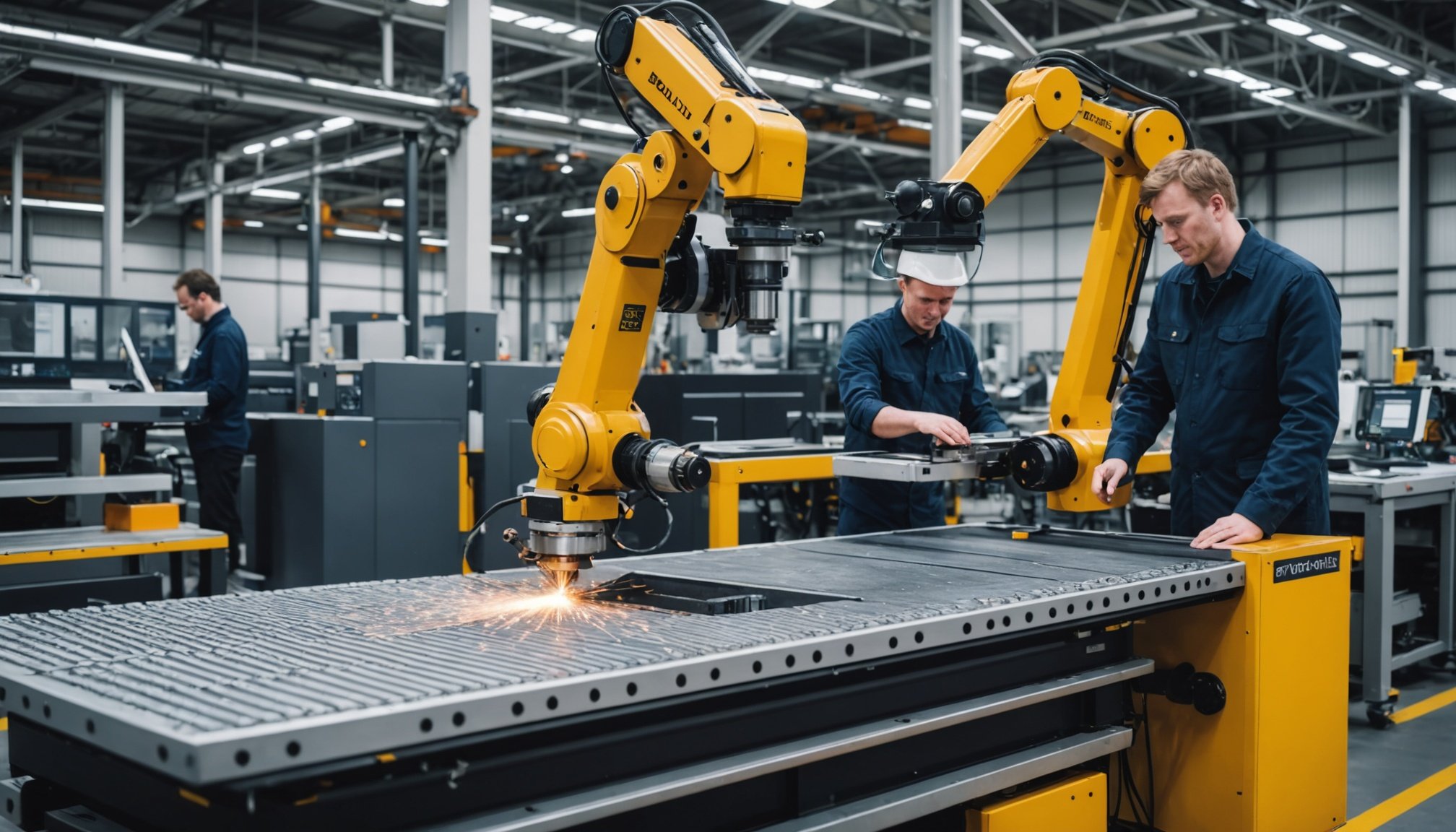Overview of AI Integration in UK Manufacturing
The landscape of AI in manufacturing in the United Kingdom is experiencing a rapid transformation. As industries strive to remain competitive, the integration of AI technologies becomes pivotal. UK manufacturing trends are inclining towards adopting not only automation but also sophisticated AI systems to streamline operations.
AI in manufacturing significantly impacts productivity and efficiency. By analysing large sets of data, AI systems optimise production processes, reduce waste, and enhance quality control. This technological evolution allows manufacturers to swiftly adapt to market demands, thereby maintaining an edge over international competitors.
In parallel : Revolutionizing fraud prevention: leveraging machine learning for safer online retail in the uk
The importance of AI integration lies in its potential to drive innovation and improvement in manufacturing methodologies. For UK manufacturers, embracing AI fosters a culture of continuous improvement and adaptation. Companies at the forefront of AI adoption experience improved performance metrics and new opportunities for growth.
Key technologies fueling AI benefits in UK manufacturing include machine learning algorithms, predictive analytics, and the Internet of Things (IoT). Machine learning enhances decision-making capabilities, while predictive analytics anticipates maintenance needs and minimizes downtime. IoT connectivity enables seamless interaction between machinery and datasets, resulting in a more efficient production environment. As these technologies evolve, their integration becomes increasingly crucial for sustaining competitive advantage.
Also to read : Mastering augmented reality: essential tactics for uk brands to create engaging marketing campaigns
Successful Case Studies of AI in UK Manufacturing
The integration of AI in UK’s manufacturing sector has led to noteworthy success stories. A leading example is Rolls-Royce, which has transformed its operations by implementing AI-powered predictive maintenance. This initiative has reduced engine downtime by 30%, showcasing a significant enhancement in manufacturing efficiency and productivity.
Another compelling case study is the use of AI by Ocado in its automated warehouse systems. By deploying AI algorithms for inventory management and logistics, Ocado has increased order fulfillment speed by 50%, thereby setting a benchmark in modern manufacturing efficiency. The results underline AI’s capability to optimise resources and streamline operations.
Lessons learned from these implementations reveal that an effective application of AI requires a well-thought-out strategy and skilled personnel to interpret data insights. It also underscores the importance of continuous innovation and adaptation to maximise the benefits of AI technology.
The success stories of UK companies illuminate that, although integrating AI demands investment and upskilling, the long-term gains in productivity and efficiency justify the effort. These case studies serve as a road map for other manufacturers seeking to harness the power of AI, demonstrating its potential to revolutionise the sector.
Practical Approaches to Implementing AI Technologies
Integrating AI technologies into existing systems requires careful planning and structured strategies. Companies need to develop robust AI integration strategies to achieve seamless incorporation into their manufacturing processes.
Step-by-step framework for AI adoption
- Assessment: Evaluate current capabilities and identify areas where AI can add value.
- Pilot Testing: Implement a small-scale AI application to understand its practical implications.
- Scaling: Once proven successful, gradually expand AI applications across various manufacturing processes.
Tools and technologies for streamlined integration
Utilise comprehensive implementation frameworks like Microsoft AI or Google AI tools designed for efficient integration. Platforms such as TensorFlow and PyTorch also provide strong support, enabling businesses to accelerate deployment.
Training and upskilling workforce for AI utilization
The transition to AI-driven operations isn’t just about tools but also about people. Training and upskilling initiatives are vital, ensuring employees are equipped to leverage AI platforms effectively. Key steps include:
- Offering hands-on workshops on crucial AI tools.
- Providing resources for continuous learning.
- Encouraging cross-functional collaboration to understand the benefits and applications of AI in various processes.
A well-rounded approach to AI integration involves both technological and human elements, ensuring successful and sustainable adoption across manufacturing entities.
Overcoming Challenges in AI Integration
Integrating artificial intelligence into existing systems can seem daunting due to several common barriers. These challenges include technological complexities, resistance to change, and a lack of understanding among personnel. Organisations often struggle with legacy systems that are incompatible with modern AI solutions, leading to costly and time-consuming adjustments.
To surmount these AI integration challenges, it is crucial to adopt strategic approaches. One effective strategy is investing in change management initiatives. This involves training sessions and workshops to familiarise employees with AI technologies and their benefits. Additionally, creating a dedicated team responsible for overseeing the integration process can facilitate smoother transitions.
An essential element in overcoming these barriers is securing stakeholder buy-in. Communicating the long-term value and potential of AI-enabled systems can help garner support from decision-makers. Furthermore, involving stakeholders early in the planning process promotes transparency and encourages their active participation in the integration journey.
Moreover, forming collaborations with technology experts and consultants can provide valuable insights and guidance. Such partnerships can help organisations navigate technical obstacles and select appropriate AI solutions that align with their goals. By addressing these hurdles, companies can successfully optimise their operations and enhance productivity through effective AI integration.
Maximizing Efficiency through AI
Artificial intelligence (AI) has become a cornerstone in enhancing operational efficiency across various industries. By leveraging vast amounts of data, AI enables more informed decision-making, leading to significant performance improvements. This is evident in sectors like manufacturing, where AI drives innovation by optimizing production processes.
AI systems are adept at analyzing data in real-time, which enhances decision-making by identifying potential issues before they escalate. For instance, in manufacturing, AI can predict equipment failures through advanced data analysis, a practice known as predictive maintenance. This reduces downtime, ensuring that machines are functional and efficient. Predictive maintenance not only maximizes the lifespan of equipment but also minimizes interruptions in production, ultimately boosting efficiency.
Moreover, AI fosters innovation by enabling companies to experiment with new processes and technologies. For example, in the automotive industry, AI can streamline assembly lines, leading to faster and more efficient vehicle production. The ability to simulate new production scenarios before implementing them reduces risks and encourages creativity.
In summary, AI benefits industries by enhancing operational efficiency, improving performance, and driving innovation. Its application in areas like predictive maintenance exemplifies how AI can transform traditional practices, reducing costs and improving overall productivity.
Future Trends of AI in UK Manufacturing
The trajectory of AI trends within UK manufacturing is set to redefine the industry’s landscape. With the ongoing technological evolution, factories are fast becoming smarter and more efficient, integrating a range of innovations poised to enhance productivity.
Emerging technologies like machine learning and the Internet of Things (IoT) are projected to play significant roles in shaping the future of manufacturing. These advancements are likely to foster innovation through predictive maintenance, which uses AI to foresee equipment failures and minimize downtime. This predictive capability not only enhances operational efficiency but also extends the lifespan of machinery.
Predictions for AI evolution suggest that these technologies will continue to advance, enabling more adaptive and autonomous systems. The integration of AI in manufacturing processes promises to revolutionize not only how products are made, but also how they are managed and optimized throughout their lifecycle.
AI’s role in sustainability and eco-friendly practices cannot be overlooked. By optimizing resource use and minimizing waste, AI technologies support more sustainable manufacturing processes. They also contribute to eco-friendly practices by reducing carbon footprints and energy consumption, ensuring that the manufacturing sector aligns with green initiatives while maintaining high standards of production efficiency.











